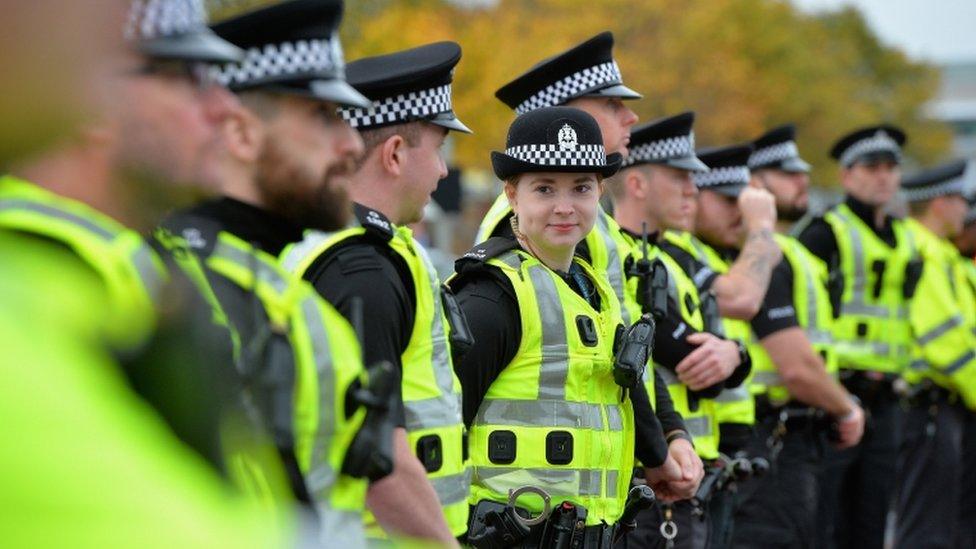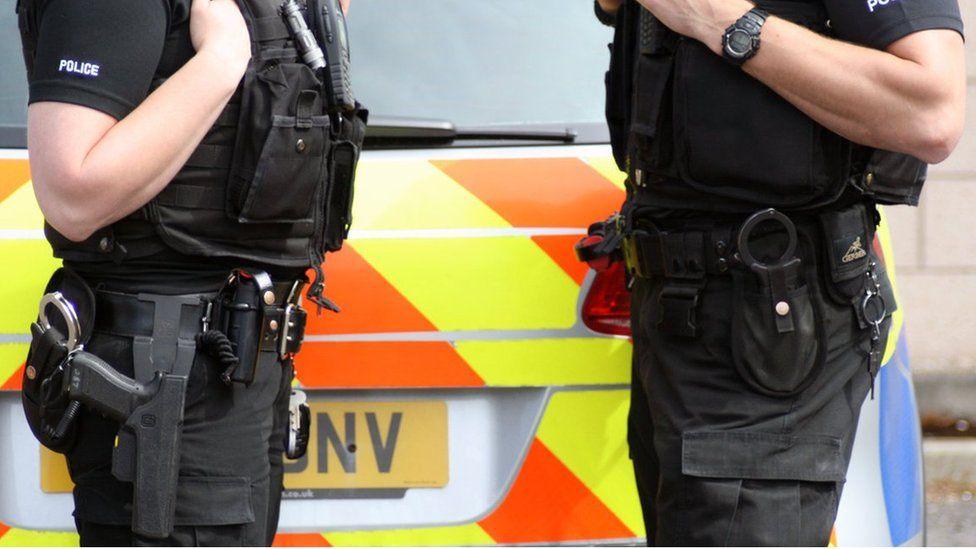Watchdog urges Police Scotland to become 'more inclusive'
- Published

Police Scotland must be more pro-active in communicating that is an "anti-discriminatory and inclusive organisation", a watchdog has found.
A report, external found the recruitment of women and people from ethnic minority backgrounds has increased.
But a survey of 542 serving and ex-officers found less than half would recommend a career in policing.
The force said it was committed to becoming more representative of society through recruitment and promotion.
The HM Inspectorate of Constabulary in Scotland (HMICS) report comes a fortnight after a tribunal found evidence of a "sexist culture" in its armed policing.
It looked specifically at the recruitment, retention, development and promotion of people from under-represented groups.
HMICS found "evidence of genuine commitment at the most senior levels" of Police Scotland to ensure that the service is welcoming and inclusive.
'Increasing concerns'
But the report continued: "There are fewer signs that the leadership message is being translated into action that has a consistent positive impact on the day-to-day experience of police officers and staff from under-represented groups.
"The report is published against a background of increasing concerns about racism and sexism in society, with recent events bringing the challenges facing policing into sharp focus.
"The report recommends that Police Scotland should assert a strong and bold position in its internal and external communications that it is an anti-discriminatory and inclusive organisation."


A police staff survey revealed claims of misogyny and bullying within the force
'Fear and misogyny is rife'
The survey, conducted for the report, was completed by 330 current employees and 212 who had left the force.
Less than half of respondents (47.6%) said they would recommend policing as a career to family and friends, while just over half (50.9%) said they would not recommend Police Scotland as an employer.
Feedback from female respondents included:
"We have an appalling culture driven by fear and misogyny is rife. Older women are treated terribly. They are overlooked and undervalued"
"Police officers are blocked at every opportunity to develop themselves, bullying is rife and sexism is well and truly alive in PS today with sexist comments and put-downs part of everyday culture."
"I have been sexually assaulted at work, as have most female colleagues I have spoken to. I have also spent years being on the receiving end of sexist 'jokes' and banter".
On the issue of ethnicity, the comments included:
"Most people from ethnic minority background don't feel they belong here and they feel that the colour of their skin and accent is a hurdle when it comes to their progress."
"Daily racial micro aggressions, pack-like canteen culture. Can't report mistreatment and bad behaviour as shift will turn against you."
"There is always a sense of 'being different'. A small minority have passed comment on my protected characteristic and it being used as a 'tick box' exercise giving me the feeling of not belonging rather than recognising me for my merit."
Despite the submissions, HMICS said they must be placed in context given the UK's second largest force employs 23,000 people.
Its summary noted: "This is a self-selecting group of respondents, and the survey does not purport to be statistically significant nor to describe the experience of the majority of people in Police Scotland."

HM Chief Inspector of Constabulary Gill Imery said racism, sexism, homophobia and other forms of intolerance were pressing issues for the whole of society, not any one organisation.
And she cautioned that positive action to help people from under-represented groups overcome barriers was often "misunderstood" by some members of the public.
Ms Imery added it would be "naïve" to think some of these views were not shared by some of Police Scotland's employees.
She said: "To maintain public confidence, it is important the police service reflects the communities it serves."
Ms Imery said attracting a wider range of recruits depended on the levels of "trust and confidence" they have in the force.
On women and people from minority ethnic backgrounds, she added: "Recruitment from these groups has increased over the past year, however challenges remain with overall representation, and in the visibility of under-represented groups in senior ranks and management levels."
The report is the second phase of a thematic inspection of the force's training and development.
The first, published in September last year, strongly criticised Police Scotland for its leadership and diversity training.
The latest report, which contains 10 recommendations, also calls for a greater focus to be placed on retention, which it describes as "equally as important as recruitment".
'Foster culture change'
Deputy Chief Constable Fiona Taylor acknowledged there is much work to be done.
She said: "This report recognises our commitment to building a service with a culture founded on our values so that we better reflect, represent and serve the public.
"Although HMICS acknowledges the limitations of the survey conducted as part of this inspection, the Chief Constable has been clear that police leaders must enable and support those who speak up so that they can be heard."
Overall workforce profiles show that 32% (5709) of police officers are female, and 1% (253) of police officers are from Black Minority Ethnic backgrounds.
This compares to the general population where 51.1% are female and 4% from Black Minority Ethnic backgrounds.
Ms Taylor added: "We have introduced a recruitment and promotion process based on our values.
"Our intakes are more representative of society than in the past and our leadership training will foster culture change."
A Scottish Police Authority spokesman said: "This HMICS thematic report acknowledges positive progress that has been made by Police Scotland to address concerns around diversity and equality within policing.
"Whilst there is no doubt that more needs to be done in this area, Police Scotland's leadership team have set out a clear commitment to developing and building an inclusive organisation that reflects and represents the public it serves."
Last year, an independent review highlighted concerns about the treatment of recruits from ethnic minorities, the LGBTI community and women.
And Dame Elish Angiolini QC said the police watchdog should be given greater powers to deal with complaints against the national force.